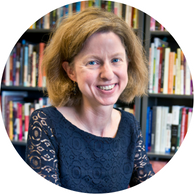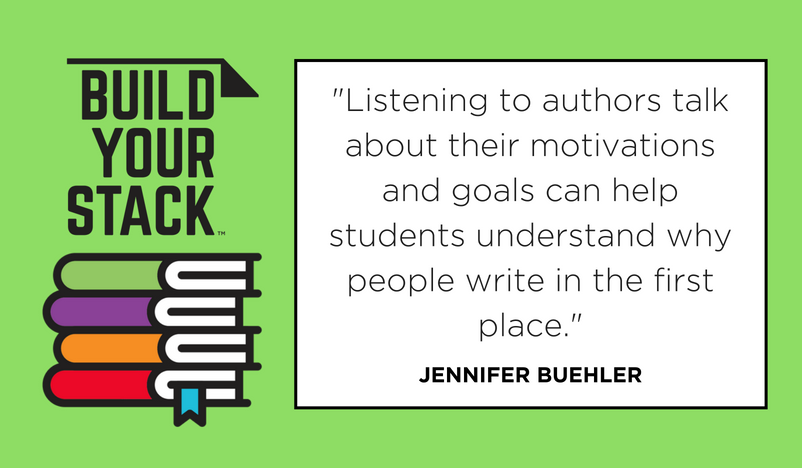This blog post is part of Build Your Stack,™ a new initiative focused exclusively on helping teachers build their book knowledge and their classroom libraries. It was written by NCTE member Jennifer Buehler.
One of the many things that makes teaching young adult literature relevant is the opportunity to bring the voices of YA authors into the classroom. In the past, the only way to reach out to authors was by sending them letters in care of their publishing companies. Now, with the help of the Internet, there are countless ways to discover what authors are thinking about and doing in the world. Through social media, book tours, and school visits, YA authors are more accessible than ever before.
What do we and our students gain from this access? Making a personal connection with an author can deepen a reader’s book love, but there’s potential here for far more substance. When we bring authors’ voices into the classroom, we add layers of complexity to book discussions. We gain insight into the writing process, we add nuance to interpretations of texts, and we help students see a book as a series of choices. We also make English class more real. Books don’t come from a cold, dry place; they develop out of the hearts and minds of real people. Listening to authors talk about their motivations and goals can help students understand why people write in the first place.
Here are some places where I seek out the voices of YA authors and find material that enriches my teaching:
- Websites and blog posts. Apart from book-length works (see Rowman & Littlefield’s Studies in Young Adult Literature series), websites are the most traditional source of information about authors. Here readers find details about the author’s life and career, book reviews, awards, educator resources, upcoming events, and information on how to request a school or Skype visit. Readers also get glimpses of the author’s personality through photographs, frequently asked questions, and lists of favorites. Best of all are blogs where authors share thoughts and feelings about the long process of writing a book and the ups and downs of publishing. (Two rich examples are Francisco X. Stork’s poignant online journal and A. S. King’s “Writer’s Middle Finger” series, searchable here.)
- Podcasts and YouTube videos. I love listening to authors talk about their craft on podcasts (Sara Zarr’s This Creative Life is a great resource). Even better is searching for videos of authors on YouTube (start with Jason Reynolds). Here I get to observe the author as a person while I learn more about their books. I take note not just of what the author says, but how they interact with interview hosts, rooms full of students, and live audiences at bookstores and book festivals. I learn about the human behind the words.
- Social media. For direct connection to authors, social media provides almost instant access. On Twitter, Facebook, and Instagram (Jacqueline Woodson’s account is a favorite), readers hear what an author is thinking and doing in the moment. They see photos and discover links to media appearances, current events, and articles of interest. They observe authors weighing in on politics and interacting with fans and peers. Social networks become visible here. Who is an author’s editor or agent? Who does an author count as a friend? Answers can be found by noticing who comments on, follows, likes, or retweets whom.
- Local events. Many authors travel the country making library and bookstore visits. Find out about these by reading the newspaper and subscribing to e-newsletters from libraries and independent bookstores. At live events readers listen to authors talk about their latest project, read aloud from their books, and answer audience questions. Sometimes it’s possible to talk with the author in person while getting your book signed. When I attend these events, I write down what authors say and bring those anecdotes back to the classroom. In-person interactions with authors fill me up with lasting impressions I can’t get any other way. I share all this with students in hopes that they’ll be inspired to seek their own forms of connection with the authors they most need to hear from.
 Jennifer Buehler is an associate professor of English education at Saint Louis University and a past president of ALAN, the Assembly on Literature for Adolescents of the National Council of Teachers of English. As the author of Teaching Reading with YA Literature: Complex Texts, Complex Lives (NCTE, 2016), she leads workshops for teachers on innovations in young adult literature and ways of engaging teens as readers. Find her on Twitter at @ProfBuehler.
Jennifer Buehler is an associate professor of English education at Saint Louis University and a past president of ALAN, the Assembly on Literature for Adolescents of the National Council of Teachers of English. As the author of Teaching Reading with YA Literature: Complex Texts, Complex Lives (NCTE, 2016), she leads workshops for teachers on innovations in young adult literature and ways of engaging teens as readers. Find her on Twitter at @ProfBuehler.

